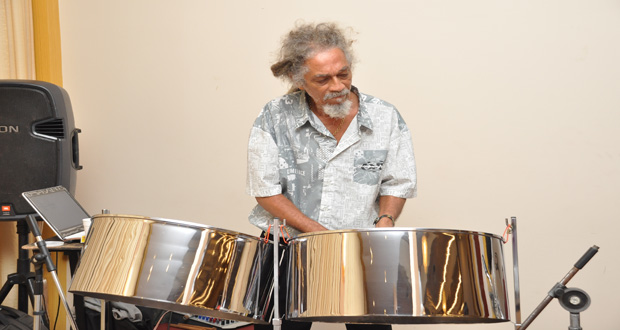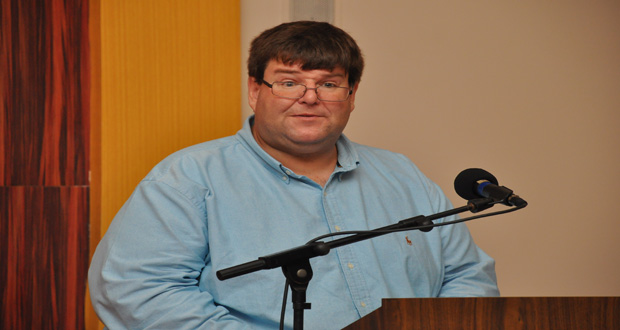U.S. Charge d’Affaires… Too many lives being lost to suicide – problem compounds human capital shortages
US ChargÉ d’Affaires, Brian Hunte, is of the opinion that with a suicide rate of 44.2 per 100,000 per year, too many lives are being lost in Guyana, a country already struggling with human capital shortages.The loss, Hunte said, is due to a lack of solid investment in improved mental health outcomes. He was, however, quick to recognise the efforts being made by the Administration to address this problem.
The Government has invested some $23 billion in the health sector this year, a significant portion of which will go towards mental health.
Speaking at the Annual Awards for Business Excellence 2015, staged by the Guyana Business Coalition on Health Awareness at the Pegasus Hotel, the US diplomat said Government’s investment in mental health is a step in the right direction, as is establishment of the Guyana Police Force’s ‘Suicide Helpline’.
He noted, however, that Government action alone is not enough in this battle. “It takes more. Every corporation or business that depends on employees and customers to sustain their operation must lend a helping hand to the community in which they operate,” the diplomat told the gathering of mostly members of the business community.
Chief Executive Officer of Starbuck’s Coffee, Howard Shultz, had earlier said: “Companies should not have a singular view of profitability. There needs to be a balance between commerce and social responsibility…. The companies that are authentic about it will wind up as the companies that make more money.”
According to Hunte, one does not have to be Howard Shultz or Bill Gates to make a difference. “We can look to Berbice, where the incidence of suicide is known to be high, where the Humanitarian Mission of New Jersey Arya Sama Mandir -– a solely private, donor-funded organisation — just recently opened a Training and Counselling Centre, where young people can learn new job skills, receive counselling, and prepare for some of life’s more difficult challenges.
“Efforts such as these — to provide training, education, counselling, and empowerment to young people — are going to be critical if we are to improve mental health outcomes and strengthen communities. It is my fervent hope that more such spaces are created through private sector funding across the length and breadth of Guyana,” the US ChargÉ d’Affaires said.
DO MORE
Hunt said that, as Suicide Prevention Day approaches on September 10, all stakeholders must do more to reach out to people who are struggling with depression and may need help.
In addition, the root causes of depression –- lack of socio-economic opportunities, sexual abuse, alcoholism, gender-based violence, isolation, and ingrained societal discrimination -– must be forthrightly and systematically addressed, Hunte urged.
He also lauded the progress Guyana has made in putting down HIV/AIDS. Guyana’s efforts were ably boosted by assistance from the US President’s Emergency Plan for AIDS Relief, or PEPFAR.
The achievements to date include widely available HIV counselling and testing; improved access to treatment and uptake; improved availability of support services for HIV care, such as lab testing and case navigation; and Government-supported complementary programmes like the food bank. And perhaps most importantly, significantly, there should be decreased HIV-related mortality.
“To sustain the gains and achieve epidemic control, renewed focus is required for groups at elevated risk for sustained transmission, as identified in Guyana’s own HIV/AIDS strategy documents. It also involves ensuring a human rights approach to health.
“Irrespective of sexual orientation or gender identity, every single Guyanese citizen should have the right to access health-care free of discrimination and stigma,” the diplomat said.
The PEPFAR project is now in the midst of what some say is the most challenging but exciting phase yet —- Phase III, which focuses on sustainable control of the Epidemic.
Chairperson of the Guyana Business Coalition on Health Awareness, Donna Roberts-Benjamin, has said that the mandate of the organisation is to mobilise the business community to respond to HIV/AIDS and health awareness.
Since its establishment 7 years ago, the business coalition has collaborated with its members, governmental and non-governmental partners, as well as developmental partners, to raise awareness of the HIV/AIDS situation in Guyana.
The coalition is one of the sub-recipients of Guyana’s Global Fund Grant, and provides technical assistance to 5 non-government organisations (NGOs) which implement activities to reach key populations affected by HIV/AIDS.
OTHER CHRONIC ILLNESSES
Roberts-Benjamin told the Pegasus gathering that, aside from HIV/AIDS, focus is also being placed on other chronic illnesses in addition to domestic violence and mental health.
“I would like to commend the members of the Guyana Business Coalition on Health Awareness who expressed the need to address issues like diabetes, nutrition, and hypertension, and (have) worked with our Board and staff to implement the activities,” she said.
Despite major challenges experienced with reduced funding, the Business Coalition continues to evolve in the changing landscape.
The coalition’s chair thanked the United States Agency for International Development (USAID), UNAIDS, the International Labour Organisation (ILO), Peace Corps, the Ministries of Public Health and Social Protection, the National Aids Programme Secretariat (NAPS), PANCAP, the Canadian High Commission, and numerous businesses for their support over the years.
Ms Roberts-Benjamin has said that even though the coalition has not received financial support for its workplace awareness programme since 2012, this year alone its secretariat added 42 peer educators to those trained to address issues surrounding domestic violence.
An additional full-time counsellor/tester was added to the coalition’s team this year through grants from the Global Fund and AIDS Healthcare Foundation. With 2 full-time counsellors, over 2500 persons have received services as of July 2015.
Tajeram Mohabir, a journalist at the Guyana Chronicle, was among the awardees. He won in the Media Action category. The award recognises his proactive and intuitive contributions in the area of health.
The other awardees were Avril Husbands of Scotiabank (Winner), Workplace Peer Educator; Sharon Mansell of Banks DIH (Honourable Mention), Workplace Peer Educator; Society Against Sexual Orientation Discrimination (Winner) Partnership; Merundoi Incorporated (Honourable Mention), Partnership; Republic Bank Guyana Limited (Winner), Workplace Programme; Scotiabank (Honourable Mention), Workplace Programme; Scotiabank (Winner), Community Investment; and Massy Gas Products Guyana Limited (Honourable Mention), Community Investment.
The dinner and awards ceremony was attended by Minister within the Ministry of Public Health, Dr Karen Cummings; members of the diplomatic community and regional and international organisations supportive of the work of the Guyana Business Coalition on Health Awareness.





